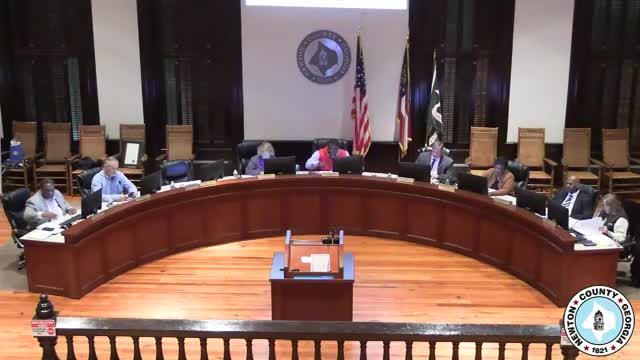Newton County to hold public hearings on HB 581 floating homestead exemption after revenue briefing
Get AI-powered insights, summaries, and transcripts
Subscribe
Summary
Newton County commissioners said they will schedule three public hearings on House Bill 581 after a Jan. 16 work session outlining how the new floating homestead exemption could reduce county property‑tax revenue and shift costs to non‑homestead taxpayers.
Newton County commissioners said they will schedule three public hearings on House Bill 581 after a work session briefing on Jan. 16, 2025 that laid out how the law’s new floating homestead exemption could reduce county property‑tax revenue and shift costs to non‑homestead taxpayers.
Attorney Aaron Myers of Gerard & Davis told the Board of Commissioners the law creates “a statewide floating homestead exemption that's going to apply to all homestead property in the state of Georgia unless the local governments opt out.” He recommended the county hold three public hearings so residents can understand trade‑offs before the board decides whether to opt out.
The nut graf: HB 581 freezes the taxable value of owner‑occupied homes (subject to limited annual growth), which benefits long‑term homeowners but reduces the residential tax digest growth county officials use to fund services. County staff presented numerical scenarios showing multi‑million‑dollar shortfalls to county, city and school revenues if the county does nothing and the exemption takes effect.
Chief Appraiser Marty Kennard presented modeled revenue impacts. “What you're looking at is a $17,000,000 loss in revenue,” she said when describing an historical scenario; in a more conservative near‑term projection she showed a county‑only loss of about $4,600,000 and larger losses for the school system. Kennard’s figures separated county‑only millage impacts from potential city and school effects and noted the analyses assume annual market changes and an assumed 3% CPI cap used in the model.
Myers and Kennard explained how the floating exemption works: a homeowner’s taxable value is effectively locked to a baseline year (with allowed annual increases capped, commonly at 3% or an inflation factor set by the state Revenue Commissioner). If the county takes no action, the state law would apply automatically. Local taxing jurisdictions — each city, the county and the school district — can opt out by conducting three public hearings, publishing a legal notice at least one week before the first hearing, and adopting a resolution before the opt‑out deadline, which Myers said is March 1.
Board members asked how the loss would be covered. Myers summarized the trade‑offs: “While we're freezing the home values for some people, and we're locking that in for tax purposes, they're going to see a benefit. You're going to have to increase taxes on others in order to maintain the level of services that you're currently providing.” He said one remedy is a floating local option sales tax (FLOST), which would shift some revenue from property taxes to sales taxes and allow jurisdictions to roll back millage rates using sales tax receipts.
Commissioners pressed on specifics: Commissioner Edwards asked whether the 3% cap is the maximum; Myers replied the law caps annual growth at 3% or an adjustment determined by the Revenue Commissioner and said counties should assume the 3% cap is likely. Commissioner Long questioned the realism of a 6% annual appreciation rate used in some projections and warned against relying on optimistic growth forecasts. Commissioner Landon and others discussed the possibility of seeking a locally tailored option through the county’s legislative delegation, which Myers said is possible but would require additional voter approval and multiple tax cycles to implement or undo.
No formal decision to opt out was taken during the work session. The board’s chair said the county will schedule three public hearings as part of the information and outreach process; later, Commissioner Mason moved to adjourn, Commissioner Long seconded, and the motion passed by voice vote with the chair saying, “All in favor.”
What remains unanswered: the board has not set hearing dates in the transcript and no resolution to opt out was introduced or adopted. The briefing flagged several implementation details that will be addressed at public hearings and future meetings, including the precise revenue forecasts, assumptions about market growth, the amount of any FLOST the county might adopt, and whether neighboring jurisdictions will opt out (which affects FLOST eligibility).
The presentation and discussion placed emphasis on who benefits and who pays: long‑term homestead owners receive protection from rapidly rising tax bills, while businesses, investors and newer homeowners would likely carry a larger share of property‑tax increases if the county does not adopt offsetting measures.
The board intends to run legally required public‑notice language, hold the three hearings and then consider whether to adopt a resolution to opt out; any opt‑out resolution would be transmitted to the Georgia Secretary of State as required by state law.
